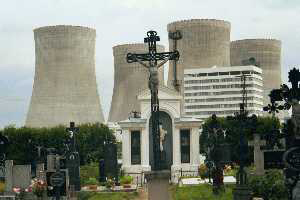Nuclear Power
*It’s probably a lost cause, and it’s certainly a dangerous, expensive and unnecessary program, but that isn’t stopping South Carolina from trying to keep those taxpayer pork dollars flowing to the Savannah River Site. Yesterday, the state filed suit against the Department of Energy for its recent announced plan–which it appears to be implementing–to put the MOX plutonium fuel factory under construction into a “cold standby” status in preparation for ending the project entirely. Though the factory is said to be 60% complete, the estimated cost of finishing and operating the plant is $25 Billion, which DOE and the Obama Administration don’t want to spend. With few, if any, real customers wanting to use plutonium fuel because it’s too expensive (and a lot of reactors can’t use it without expensive modification), the Administration has decided the project is just a boondoggle. South Carolina doesn’t really care–we’re not sure state officials even know–what the plant does and its economic realities. They just want your and my tax money heading to South Carolina whether MOX fuel makes any sense or not.
*The Department of Energy (DOE) isn’t doing itself any favors, nor adding to its credibility, with its handling of the February 2014 radiation leak at the WIPP transuranic radioactive site in New Mexico. Now the DOE belatedly reports there was another radiation release from WIPP on March 11 (ironically on the third anniversary of the beginning of the Fukushima disaster. DOE says the leak was small and probably caused by residual radioactive particles that were trapped in the ventilation system from the initial radiation leak.
*Electricite de France’s (EDF) quietly closed one of its two reactors at its Dungeness site in the UK for five full months last year to build a new flood wall as a result of the Fukushima disaster. But EDF initially played down the shutdown, telling the local media, “Unit 22 at Dungeness station was taken offline on 20 May for maintenance work which includes completing improvements to flood defenses for extreme events.” Then there was silence until last October when EDF announced that the reactor was being put back into service. Said Stephen Thomas, professor of energy policy at the University of Greenwich: “EDF should have made more of an announcement. If a plant closes for five months it is not just fiddling about, it is something serious and EDF can’t pretend it’s not.”
*New testing by the Environmental Protection Agency (EPA) indicates that World War II-era radioactive waste is migrating from the West Lake landfill near the St. Louis airport to the adjacent Bridgeton landfill, where an underground fire has been raging for years. The West Lake landfill is a Superfund site being overseen by the EPA. Missouri Attorney General Chris Koster said that if the radioactive migration is confirmed and has reached the Bridgeton landfill, the EPA must take over that landfill as well. The waste there is left over from the World War II effort to build an atomic bomb, and the site is the nation’s oldest radioactive waste dump, although it was never designed to store radioactive waste. 70 years later, and there is still no safe home for the first radioactive waste ever generated–nor for any of the waste generated since.

*The prospect of construction of two new reactors at the Temelin site in the Czech Republic is a poster child for the poor economics of new nuclear power, writes Michael Kanellos for Forbes. New reactors are just too expensive for companies to build without government support, and in the Czech Republic that support doesn’t seem to be forthcoming. The utility, CEZ, is straightforward about its need for tax dollars: We won’t build without state guarantees,” Pavel Cyrani, chief of strategy at CEZ told Bloomberg in an interview. “It’s simply impossible.”
The article asks, “How high would those guarantees have to be? A pair of studies from Candole Partners predicts that the price would have to be 115 Euros a megawatt hour, or $157 per megawatt hour, in 2013 dollars for the full lifetime operation of the Temelin reactors for it to break even.”
The article goes on: “The subsidies required to make power from the plant competitive with today’s prices would cost taxpayers around a billion Euros a year, wrote Georgi Vukov at Candole.” Unlike the UK, where the government wants to subsidize construction of new Areva reactors at a cost twice that of current wholesale electricity prices, the Czech government doesn’t appear inclined to spend that kind of money.
*Chernobyl 28 years later: workers are still limited to 15 minute/day shifts inside the reactor. A photoessay from deep inside Chernobyl and the nearby area from Slate. Worth a look.
Clean Energy
Last year, the extreme-right ALEC (American Legislative Exchange Council) failed in every one of its efforts in state legislatures to roll back renewable energy standards. And while ALEC is changing its strategy this year to attack net metering laws that encourage solar power development, it doesn’t look too promising for them again. Two articles on ALEC’s (and by extension the nuclear and fossil fuel industries) failure so far this year in Washington and Utah, with some other states close behind.
*People living near wind farms, worry no more. You have a better chance of being hit by a meteor than being hurt by a wind turbine accident. Some anti-wind power groups–and there are more of them than you might think–like to spread spurious claims that wind power is somehow harmful to people and that turbines must be set up far away from any households. This article should set the record straight.
Inside Washington

Nuclear Regulatory Commissioner William Magwood has announced that he will be leaving the NRC a year or so early to become head of the OECD’s Nuclear Energy Agency. He is expected to move on by September although his NRC term lasts until June 2015. To all or our European friends, what can we say but: we’re sorry! But we can’t say we’ll miss him. This will likely leave two vacancies, both democratic seats, for President Obama to fill this year. NRC Commissioner George Apostolakis’ term expires this June, and it is believed he will not seek re-appointment.
Michael Mariotte
March 19, 2014
Permalink: https://www.nirs.org/2014/03/19/nuclear-newsreel-wednesday-march-19-2014/
You can now support GreenWorld with your tax-deductible contribution on our new donation page here. We gratefully appreciate every donation of any size–your support is what makes our work possible.
Comments are welcome on all GreenWorld posts! Say your piece above. Start a discussion. Don’t be shy; this blog is for you.
If you like GreenWorld, you can help us reach more people. Just use the icons below to “like” our posts and to share them on the various social networking sites you use. And if you don’t like GreenWorld, please let us know that too. Send an e-mail with your comments/complaints/compliments to nirs@nirs.org. Thank you!
Note: If you’d like to receive GreenWorld via e-mail daily, send your name and e-mail address to nirs@nirs.org and we’ll send you an invitation. Note that the invitation will come from a GreenWorld@wordpress.com address and not a nirs.org address, so watch for it.



